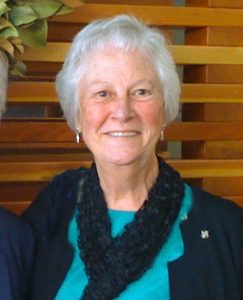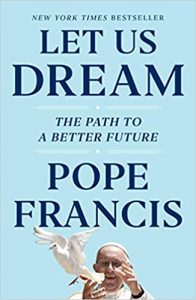- All
- Wisdom
- We Stand on Their Shoulders
- Vocation
- Uncategorized
- Stories Seldom Heard
- Spirituality
- Social Justice
- Prayer
- Peace
- Oneness
- Love
- Letting Go
- Lent
- Joy
- Inspirational Images
- Hope / Healing
- Holy Week
- Gratefulness
- God's Presence
- General News Stories
- Forgiveness
- Finding God
- Faith
- Easter
- Dominican Saints
- Discipleship
- Courage
- Christmas
- Catholic Sisters Week
- Care of the Earth
- Blessing
- Beauty
- Advent
- #justiceOPportunity
Let Us Dream
Sr. Patricia Bruno, OP

259th Edition
February 2021
 This month’s article for Stories Seldom Heard is different from most. Usually, we explore passages from scripture and apply them to our lives. However, Pope Francis’ newest book Let Us Dream written in collaboration with the Pope’s biographer, Austen Ivereigh, has just become available. There are a variety of book reviews online, but I would like to focus on one area of the book that I think is extremely important.
This month’s article for Stories Seldom Heard is different from most. Usually, we explore passages from scripture and apply them to our lives. However, Pope Francis’ newest book Let Us Dream written in collaboration with the Pope’s biographer, Austen Ivereigh, has just become available. There are a variety of book reviews online, but I would like to focus on one area of the book that I think is extremely important.
The book has three major sections. The middle chapter is entitled “A Time to choose.” Before we continue exploring this chapter, I would like us to think back to the Year of Mercy in 2015.
Many of us can remember this year vividly. Parishes offered retreats and special liturgies, opportunities to study (especially the Pope’s book, The Name of God is Mercy), and designated specific church doors as the “Door of Mercy” similar to the one in Rome. The church referred to this Year of Mercy as a Kairos moment. Kairos is a Greek word that refers to a particular time of grace: a time when we have the ability to see life differently and act on our new insights. Kairos times often come in times of crisis when we have the opportunity to make significant changes in our lives. If we are attentive and willing to be guided by the Spirit, these moments of grace can lead to major conversions both individually and collectively. If we decide to remain indifferent to what is being asked of us, Kairos moments can pass us by.
It seems that 2020 is another Kairos moment. Most everything in our lives has changed. The coronavirus and civil unrest, to name two major issues, have unmistakably exposed the huge inequalities in our nation and the world. In the midst of the enormous misery, suffering, and deaths, the isolation we have experienced has given us time: time to slow down, question our intentions and actions, adjust our sight, and listen more carefully to the world around us in light of our Gospel values and our call to discipleship. Even though this has been a difficult time of isolation, for many of us, it has also been a season of deep reflection.
 Let Us Dream is an outgrowth of the Pope’s deep reflection on the events that have caused dramatic changes in our lives. The title of the book is taken from the words of the Prophet Isaiah where God says, “Come. Let us talk this over. Let us dare to dream.” In light of everything that has and is happening, the Pope’s insights, suggestions, and hope-filled words offer us prophetic possibilities as we respectfully and prayerfully move forward together.
Let Us Dream is an outgrowth of the Pope’s deep reflection on the events that have caused dramatic changes in our lives. The title of the book is taken from the words of the Prophet Isaiah where God says, “Come. Let us talk this over. Let us dare to dream.” In light of everything that has and is happening, the Pope’s insights, suggestions, and hope-filled words offer us prophetic possibilities as we respectfully and prayerfully move forward together.
The Prologue begins with this statement. “I see this time as a reckoning—a crisis. To enter into crisis is to be sifted. Our categories and ways of thinking get shaken up; our priorities and lifestyles are challenged. We cross a threshold either by our own choice or by necessity” (p.1). With this challenge, the Pope sets out a strategy that suggests possible ways to address the multiple crises we are going through right now. Based on Catholic teaching, scripture, good communication skills, and a mature spirituality supported by prayer and trust in the Holy Spirit, the Second chapter of Let Us Dream helps us envision a path forward.
The book is divided into three chapters. The middle chapter, “A Time to Choose,” asks some difficult, but important questions. How do we, as people of faith, come to decisions when there are diverse opinions? How do we discern what is the right thing to do in a particular situation? Times of crisis open spaces for us to reimagine our world. They awaken us to our responsibility to be actively involved in creating the world God envisions for all of us. How does prayer, a quiet sitting before God asking for guidance, influence our decisions?
Crisis situations are demanding. They reveal what is in our hearts. They require vigilance. It’s hard work to hold together sharp words, disagreement, and tension, but when we hold these respectfully, listen carefully, wait expectantly, hope fervently, and pray unselfishly, the Holy Spirit will help us ask the right questions. What is the grace that is being offered to us at this time of our lives? What is the Good News hidden in the midst of our present hard reality? What conversations need to be initiated in our parishes and civic communities so all might be heard? How can we enable our communities especially our families and parishes to be places of trust, where people and opinions are carefully listened to and held with respect?
Critical issues and serious situations take time to understand. Change is a slow and organic process. Establishing communities based on trust, sincerity and the honest seeking of truth in love is the place where everyone experiences conversion. To quote Pope Francis. “It’s the new growth that takes place after a harsh pruning” (p.42). So that we will know his words are not just clever, but true, the Pope describes some of his deep learnings.
As always, Pope Francis tells marvelous stories about his own life. Like us, he has humbly learned from his experiences and his companions. When he was Archbishop of Buenos Aires, he presided at large outdoor Masses in la Plaza Constitucion for those who were marginalized and the victims of human trafficking.
What I saw in the people gathered in Constitution Square was the crowd that followed Jesus: they were dignified and they were organized. They carried within them the dignity that God’s closeness had revealed to them.
Among them were the catoneros, the men and boys who scour the streets at night in search of cardboard…to sell to recyclers….After I got to know the cartoneros I joined them one night as they made their rounds.
The Pope spoke briefly of the community organizing programs that have influenced the way he sees the world. I was surprised and pleased that the Pope mentioned his visit to Modesto, CA in 2017 where he addressed a large gathering of community organizers. I remember this event vividly since I have ministered in that area of CA. It was well-publicized because the meeting had been organized by the US Catholic Bishops’ Conference. With these examples, he continues to encourage us to discover and respond to the hidden wisdom that lives in our neighborhoods.
There is an urgency in the Pope’s writing. “This is the grace available to us now, the light in the midst of our tribulation. Let us not throw it away” (p.15)
This brief review certainly does not do justice to the tremendous insights that the Pope presents. However, I hope it will whet your appetite enough so you will read Let Us Dream and discuss it with some friends – especially with those people of goodwill with whom you do not usually see eye to eye.
